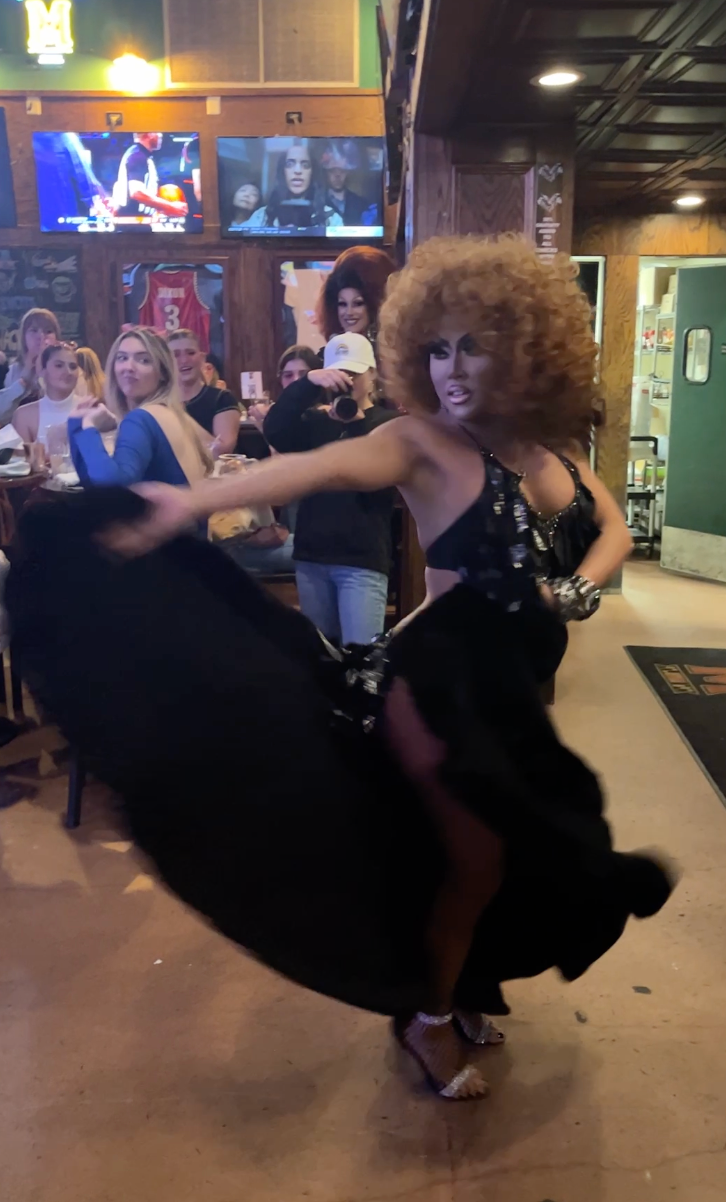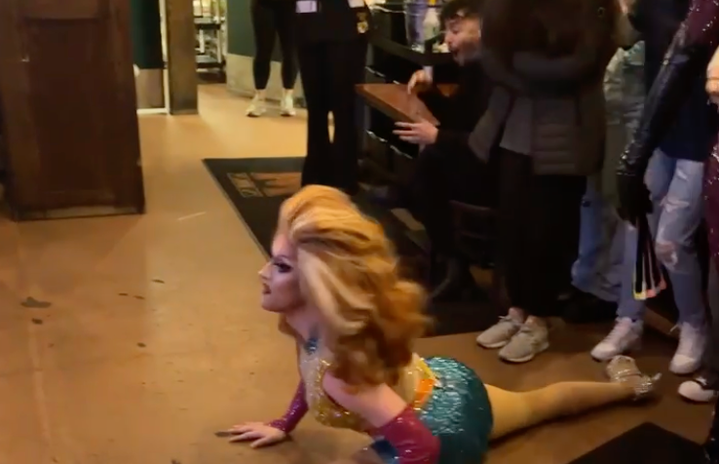On Feb. 25, Frieda Poussay and three other drag queens performed at Looney’s Pub in College Park for the first time ever.
For a sports bar known for attracting customer to watch University of Maryland sports games, the turnout for four lively drag queens was phenomenal.
Doors opened at 11 a.m. for a noon show. A line formed in the snowy weather as bouncers checked IDs and collected $10 cover, an easy price considering some drag shows steep as high as $30 in D.C.
Tables filled up quickly, yet standing room allowed more people to see the show.
Fashionably late, Frieda Poussay made her debut at the pub 10 minutes past noon, wearing a glitzy purple jumpsuit and voluminous wig. The queen started the show with a lively lip-sync, then introduced the next performer.
The outfits the queens wore were show stopping. Sparkles, studs and layers allowed for dramatic costume reveals.
Poussay and the gang involved the audience by making rounds for dollar bills in exchange for photos, hugs and kisses. During the second half, Poussay invited anyone celebrating a special event to the floor. Audience members shared their excitement about birthdays, a divorce and even a recent boob job. The energy of the crowd fueled the show and it was clear no one was bored.
The show lasted 90 minutes. The best moment was when queen Katrina slid into a split, almost taking Frieda out.
At the end of the show, Frieda gave a speech touching on the current events threatening drag.
Tennessee lawmakers recently passed the nation’s first bill restricting public drag performances. There are at least 36 more proposed bills that target drag in 14 other states.
The Tennessee bill criminalizes “adult cabaret entertainment” in public or where it could be seen by children. This includes performances by “male or female impersonators,” referring to drag queens. Drag is still allowed in age-restricted venues.
The alleged reason behind banning drag is to shield children from sexually-explicit material. Rep. Chris Todd went as far as to say drag is a form of child abuse, even though drag is not outright sexual.

Poussay’s show at Looney’s simply encouraged people to be themselves. The performance and presence of the drag queens created a safe space that welcomed everyone, a space where anyone would be accepted in any form. Though the show was 21+ due to its venue, drag brunches and story times are a popular event in D.C. and welcome people of all ages.
However, the bills restricting drag are more alarming than they seem. The legislation is fueled by homophobia, and could have greater implications than stated.
Even though drag is not a synonym for transgender, the language of emerging bills restricting drag use vague language that could be used to target trans people’s existence in public.
States like Texas and Nebraska label drag performers as people who exude “a gender identity that is different from the performer’s gender assigned at birth” and entertain an audience, according to LGBTQ+ advocacy site them.
“They are trying to equate our trans identities with an art performance, which is drag,” Rumba Yambu, director of trans advocacy group Intransitive, said.
Anti-drag legislation limits children’s exposure to a form of expression that accepts individuality and inclusion. Personal opinions aside, can’t we all agree that parents should be the ones making this decision?
“We’re not trying to be anti-anybody, anti-trans, anti-anything, we’re just trying to protect our kids,” Arkansas Republican state Rep. Mary Bentley said. But, there’s nothing about drag that needs to be hidden.
Additionally, the existence of the internet and access children have to it, makes this bill rather ineffective (take RuPaul’s Drag Race, for instance). We don’t need more laws limiting our freedom to choose what we want to do in America. We don’t need more legislation restricting our exposure to culture and other human beings.
“Seeing a drag queen doesn’t make a kid gay or trans, but it can help queer kids who are suffering so that there’s hope of being able to one day freely express themselves,” Tennessee courts administrator Lynne Pervis said.
Children need to see as many examples of representation as possible to encourage acceptance and discourage prejudices. If our youth are taught to turn a cold shoulder to the drag and LGBTQ+ community, America’s future isn’t looking too bright.
On a lighter note, Frieda Poussay is returning to Looney’s on March 11 for another lively brunch. Follow their Instagram for updates on the event.


